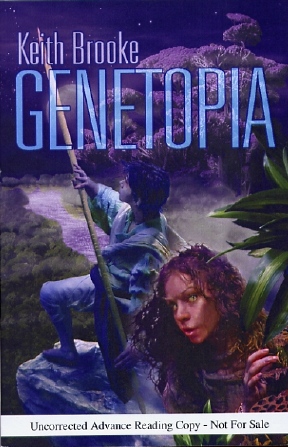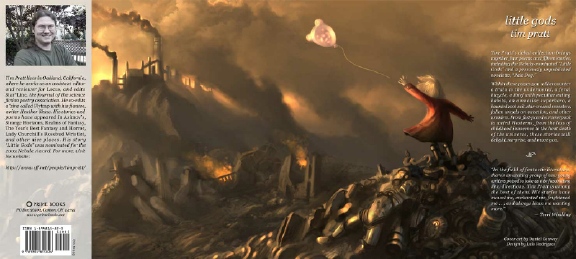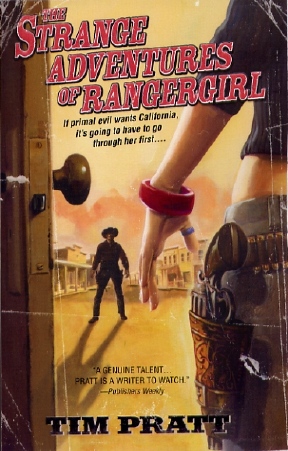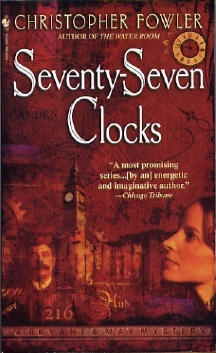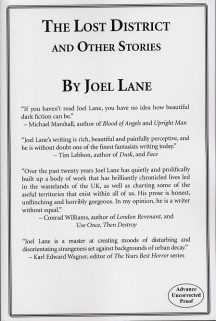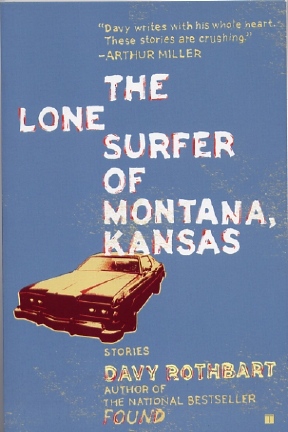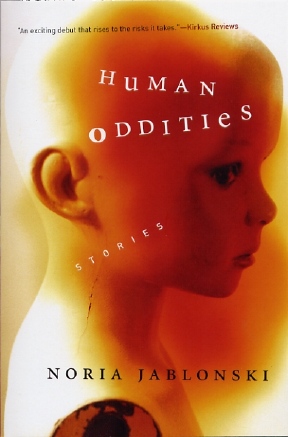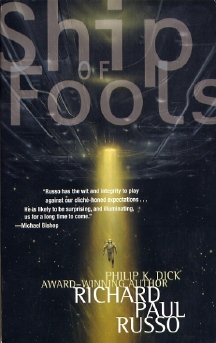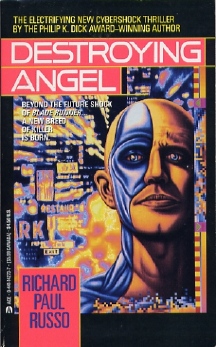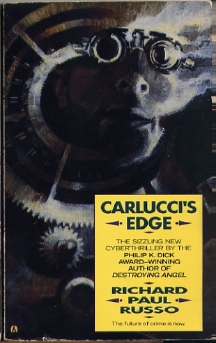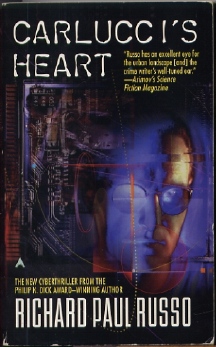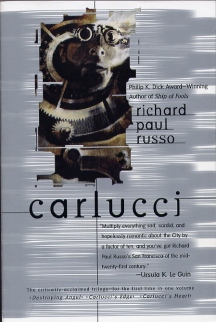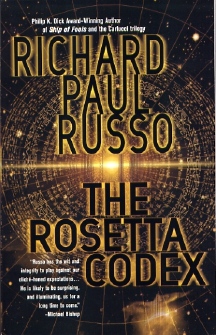|
|
|
This Just In...News from the Agony Column
|
11-25-05: Keith Brooke From Infinity Plus to 'Genetopia' |
|||
A
Really Long, Strange Trip
Your clue to this is the blurb from Jeff Vandermeer on the back cover; obviously, he likes it. But more importantly, it lists him as the author of 'Veniss Underground', a novel that to my mind was one of the major signposts along the road to the destination I'll call genefunk (jennafunk), that is, fiction based on speculation as to what will happen when genetic engineering becomes as common as say, television. Or radio. It'll be joined soon enough by Richard Morgan's 'Black Man'. I'm calling this subgenre genefunk, because I dont think that there's really the "punk rock" ethos at work here that seemed to inspire the early cyberpunk writers. These authors aren't writing about fighting the system with what's to hand. They're writing about what happens when our technology has gone organic, when forests of strangeness have blossomed across the landscape. The orientation is more ecological than rebellious, and the literary take follows more from adventure fiction than the hard-boiled mysteries that inspired the cyberpunks. Whats happening is much more classic science fiction, with interior and exterior landscapes being merged by literary techniques that combine classic science fiction tropes with the surreal feel of magic realism. But dont worry, youre not going to be overdosed with dry, serious and sententious sermonizing. Brooke's novel is the story of a man in search of his sister, simple as that. Well, as simple as that can be in a work where genetic engineering and nanotechnology have made reality almost fluid. In Brooke's future, sickness is no longer the result of a natural process. A sneeze is an indicator that something has entered you and is trying to change you from within; your sex, your thoughts, perhaps even your species. And when machines can be microscopic, the line between technology and biology essentially disappears. But Flint and his sister are true, simple humans, and Brooke's novel is a gripping exploration into a shifting value. 'Genetopia' gets around to one of the basic questions of all great literature; just what does it mean to be human? Once we can change our beings, where does humanity end and engineering begin? The beauty of all this is that this is not a new question. This is what the poets and philosophers have been asking for centuries. But genefunk -- and 'Genetopia' -- offer readers a pretty wild new vision. Combining the surreal feel of literary magic realism with "far out" science fiction visions, Brooke forges boldly into a landscape that is no less strange than we are. And look at yourselves, honestly. Fleshy critters covered in cloth, sheltering in boxes, poking at buttons on other boxes. By inhaling air and exhaling it through fluted tubes, we produce sounds, bizarre chips and grunts that mean something. It sounds really strange, unless you're sitting there, covered in cloth and poking buttons. Then it's utterly mundane. Then, along comes someone like Brooke, who puts a shiv in your worldview that slowly but surely topples everything you've thought and felt. When you journey through a fictional world that's literally alive around the characters, it's a lot easier to look at your world and realize that it's alive. You're alive. And reading! |
|
11-24-05: Tim Pratt Follows 'The Strange Adventures of Rangergirl' |
|||||
| Coffeehouse
Outlaws Readers, I hope you're there, because this one's important. Tim Pratt has been on my radar for a while now, first as a reviewer for Locus. I subscribe to Locus, and actually, kind-of, sort-of read it, through slitted eyes, with my hands in front of my face. Not that I wouldn't love to just immerse myself in their fine commentary, but heck, I need to read and review many of the same titles. So I generally just see what they're writing about, not what they're writing about the things they're writing about. But I have noted Pratt's reviews and his selections are consistently intriguing. Now that's true of all the material in Locus, but I digress. The point here is that I first noted Pratt's work as a reviewer, liked it, check that one right off. Then there was Pratt's short fiction, a lot of short fiction, actually. Much was collected in the Prime release 'Little Gods' (Prime Books / Wildside Press ; May 5, 2005 ; $17.95), and it was received with the kind of enthusiasm that made me wonder, "Well, when's the guy going to write me up a novel?" Not me, personally, of course, but readers know what I mean.
Meanwhile, back on the short fiction ranch, evidence that Pratt is perfectly suited for the readers of this column in all their literary snobbishness is available as Pratt's story "Hart and Boot" appears in 'The Best American Short Stories of 2005' (Houghton Mifflin ; October 5, 2005 ; $14.00). Edited by Michael Chabon, this collection also includes entries by Cory Doctorow and Kelly Link. Pratt has some pretty fine company in what sounds like a must-buy anthology.
On yet another hand, however (we are talking about aliens, dragons and the like) when an author well-known for speculative fiction writes a novel and said novel shows up with picture of a cowboy and a curvy cowgirl about to trade bullets, with a western-novel style typeface and a title of 'The Strange Adventures of Rangergirl', that, readers, is strange even within the weird world of speculative fiction. Hey it even gets to the level of daring, and we like daring, no we love daring, don't we? So Pratt is in, right in there, no question. But wait, as usual, there's more to like. Well, for me at least! That's because this is a novel that has a real show-down on the cover but takes place in a Santa Cruz coffee house. Say what? Yes, a Santa Cruz coffee house! There could not possibly be anything more "Santa Cruz" than a Santa Cruz coffee house, except, perhaps a book about a woman who works at a Santa Cruz coffee house and writes a comic called, yes, you guessed it, 'The Strange Adventures of Rangergirl'. But we're not yet to the heart of Santa Cruz, folks, and that's not just a good thing but a great thing. Because in Pratt's novel, Marzi McCarty, our heroine who works as an espresso-slinger, is starting to have some reality problems. Now girls with reality problems in Santa Cruz, next to me in line at the grocery store: Not Weird. But as fictional characters in speculative fiction novels: Supremely Weird. So, Marzi's reality problems involve her fiction bleeding through into her life. Again, most of the people I know have this problem; their "Truth Turns to Fiction" button seems to loom a little too large in their lives. But, I digress. Pratt's novel unravels our reality and Marzi's as Primal Darkness escapes from the back of a Santa Cruz coffee shop and uses Marzi's fiction as a tunnel out of prison. Before you can say Bagelry, characters are munching the best from the best shop in town and worrying about Apocalypse. Now this is a weird, weird mix of total reality -- I mean, I do encounter these people in the checkout line, even if it sometimes seems that they've already checked out -- and total unreality, as Pratt seems to have taken speculative fiction into a place that's weird for speculative fiction, weird for most of humanity, but part and parcel of my daily experience. Do I have to tell readers how many times I've had to put the brakes on some damn end-of-the-world "Coalition of the Willful"? By this point, I've got a checklist. At the top of that list today is: READ TIM PRATT'S RANGEGIRL DEAL. Under that is, "Reformat hard drives of Cthulhu-worshipping Organic grocery store clerks." Well, you know, you like to be prepared and organized. Otherwise, how else would I have enough time to read and write about all this fiction? |
|
11-22-05: Davy Rothbart and Noria Jablonski |
||||||
Weird
Literary Short Fiction
As usual, these are not the books that are going to jump out and bite you when you enter your local independent bookseller. You're going to find them stacked over with the so-called "quality" paperbacks. In this case, at least the sobriquet applies. Moreover, there's enough strangeness afoot to keep readers of this column happy for few evenings of late-night double-dipping. So we all know who Davy Rothbart is, right? Creator and publisher of 'Found', both the magazine and the website? Well, Rothbart's up to bat with his first collection of fiction titled 'The Lone Surfer of Montana, Kansas' (Touchstone / Simon and Schuster ; August 2, 2005 ; $12.00). And none of us know Noria Jablonski, right? Well, the McSweeney's addicts will, as she's working on their "Voice of Witness" project. But should you pick up 'Human Oddities' (Shoemaker & Hoard / Avalon ; October, 2005 ; $15.00), you'll at least begin to know if not her, then, at least her fiction. And look, you've just read about her here. Consider her one of the gang. And consider these two little short story collections as perfect companions not only for one another, but for you, the readers who are searching for short stories that are outside not just genre fiction but literary fiction as well. While Jablonski nabs the title 'Human Oddities', both writers are fascinated with those little nooks and crannies where strangeness creeps in, when the normal is overshadowed by the strange, where people step outside the boundaries of what many of us thank of as "personable". The hot-damn of it all is that the stranger things get, the more familiar they seem to even the most normal people. Take Davy Rothbart, for instance. If you've looked at 'Found' magazine, you probably think you have an idea as to what Rothbart's writing would be like, and you know, you'd probably be right. That is, the stories have the unassailable ring of truth, and yet, they seem pretty far out there, in the most entertaining way possible. 'Lie Big' tells the story of Mitey-Mike, who got away with all sorts of mischief by following his own advice; "Lie big." Like every story here, Rothbart tells this one in the first person, relating to us the story of a prodigious and entertaining liar. Rothbart's skill is in making readers feel as if every character we meet in his collection is someone we might have met in our lives. 'HOW I GOT HERE' is the all-caps story of "I HIT A DUDE WITH A SHOVEL." You know somebody like that, dont you? Well, maybe not someone who is in federal prison, but probably you know someone who is about one shovel-swing away from Club Fed. The trick with Rothbart is that all his characters and stories almost feel as if they were things he picked up, whole-cloth, stories he just found on sheets of paper stuffed in a grocery cart, or maybe that old saw, stuffed into a library book. Perhaps 'The Encyclopedia of High-Tech Crime', a book obviously unread by the story-teller. Rothbart's 162-page book sports 8 two-beer stories. Take an extra sip every time you read the word "fuck" and you might have a three-beer story. Of course, if you do that, chances are a fair amount of the beer will be recycled through your nose instead of the traditional fashion, but a few beer dots on the pages will give the book some character when you loan it to that friend who borrows books but never returns them. So, you buy two copies. Not a big deal at this price, huh, and make sure you buy that second copy after you've read and loaned the first one, so the one that remains in your archive is beer-spot free. Or not; maybe it's best to archive the beer spots, maybe it's important to archive the beer spots. In this case it's kind of unfortunate that there are no, you know, advertisement pages at the back of the book. If there were, you could flip there as you snort and try to recover from one of Rothbart's cheap-but-funny shots, then rip it out and send it to Found afterwards. But maybe you do that to a page from one of the stories, then loan the book. Imagine your book-keeping friend's face as he makes up a story as to why the page is missing from a story.
Jablonski is simply fascinated with all the permutations of human flesh, whether one finds them in a body that has washed ashore or in the spectacle of a perfectly quiet coma patient as seen by a despicable orderly who, well... You know. Even if you wish you didn't, and you can be well assured that Jablonski will tell you even if you dont want to know. Yes, you might consider this a collection of horror stories, and it's at once a much more common type of horror even if the stories themselves are of a type much more uncommon. Jablonski has noive as well, titling her body-on-the-beach story 'The Monkey's Paw'. So she's well aware of the classics, including Tod Browning, as evidenced by the story 'One of Us'. I have to say, it just gives me the creeps, but in the best possible way. Jablonski gets into the cracks and crevices that each of us might possess but would prefer not to think about. And you know that I meant mental cracks and crevices, right? Sorry about that. Now that you've recovered, youre ready for the real thing, right, not just a story about the story? Jablonski gives you nine stories for her 142 pages, but I'm still clocking these as two-beer stories, unless you've started with Rothbart. In fact, you might want to start with Davy, polish off those two beers, and then you'll be suitably marinated so as to confront Jablonski's more peculiar findings. As you lay there, that night, trying to go to sleep, with thoughts of the federal pen, or even just a ballpoint pen (dont ask) whirling in your head, yes, you can thank me, eventually, but first thank Davy Rothbart and Noria Jablonski. Think of the thriller you didn't read and dream sweet nightmares of having done so. |
|
11-21-05: 'The Rosetta Codex' |
||||||||||||||||||
The Return of Richard Paul Russo
That brightly lit, secure-but-insecure time seems vaguely unreal to me now, though in many ways, the life I currently lead is more completely filled with unreality. 'Ship of Fools' was such a good book, so intense, so filled with great writing that I was keen as heck to read Russo's next novel. So I waited. And waited. And searched. Last year, I saw an entry for Russo in *.co.uk, for a novel titled 'The Rosetta Codex'. But there was no information about the plot or content, and I began to think that it was a re-packaged, re-titled version of 'Ship of Fools'. I thought that perhaps Russo had found more lucrative work that precluded writing more fine novels. Thankfully, I was wrong.
So, let's rewind with Richard Paul Russo and catch up. Here's a wonderful writer that hasnt received the mention in this column that he a) deserves b) would have gotten had the monsters arrived a few months earlier on Maple Street. The first Richard Paul Russo novel that I encountered was 'Destroying Angel' in 1992, and I came perilously close to not reading it. From the packaging and the front cover hype, I took it to be an ultra-derivative and somewhat cheesy cyberpunk exploitation novel. But fortunately for me, I read it, and found it to be pretty damn good. In fact, real good, a gritty but not overwrought look at San Francisco in the near future, and a helluva good bit of crime fiction. It was filled with details that contributed to a great ambience, a wet, unky set of streets inhabited by losers and those lower that seemed real. And though he wasn't the main character, there was a guy in there named Carlucci who was really likeable, in a rumpled, Columbo-like way. I thought damn, this is why I love cheesy-looking paperbacks, because they so often deliver the totally pleasant surprise of great reading in a package that looks, well...cheesy.
Like 'Destroying Angel' it had a low key feel that made it as appealing to mystery fan Rick Kleffel as it was to science fiction fan Rick Kleffel. The SF was well in the background, and not just as the city of San Francisco. Russo focused nicely on Carlucci's family in a way that you dont often see in either the science fiction or the mystery genre. And finally there was a certain world-weariness, a feel of familiarity here. As if the writer knew that he wasn't setting the world on fire with something that nobody had ever seen before, and decided to simply make what he had the best he could make it. And that, conversely, sort of made it something the world had never seen before.
Looking for a novel about medical terrorists who try to fire up a pandemic? And a ready-to-go very profitable vaccine? That is, if you're not too busy worrying about it actually happening. Then this is your novel, delivered with a batch of great characters, nicely turned prose and all the turn-arounds, blind alleys and red herrings that make reading mysteries so pleasurable, compounded by some all-too-believable science fiction innovations that make that genre enjoyable. 'Carlucci's Heart' delivered precisely what the title promised; genuine emotions from a character I cared about in a setting that seemed simultaneously surreal and yet gritty, and totally there, before my reading eyes. So, sigh, three more years elapsed before those would-be saviors of the western reading world, Golden Gryphon, would cough up 'Terminal Visions' in 2000, a collection of Russo's short stories. Which, alas, has not emerged from the stacks this fine weekend, damn it. And yes, a twenty-minute search yielded up nothing, so I hope I didn't loan it to someone who didn't return it. But I believe that GG still has copies, so now, it's up to me to order one immediately.
So yes, I enjoyed the hell out of 'Ship of Fools' back in 2001, and loaned it to every SF reader I knew. That's very possibly when I loaned 'Terminal Visions' to someone and lost it as well. The general critical response to the book was excellent, and I had high hopes that he'd follow up quickly. Instead, three years passed, and then we saw 'Carlucci', an omnibus of the three Carlucci novels, packaged in a six hundred page, large format trade paperback. I liked these books so much I just re-bought it, though I'm pretty sure I have a copy of it floating about somewhere as well.
Well, who the hell knows? One thing Russo does well is to create truly alien aliens. My money is that they'll show up somewhere along the line, or at least make themselves known in the way that Russo does so well. Suffice it to say that Russo writes the kind of novels that when a new one comes out, you hunt down the others of his you've read and kept over the years -- thirteen years it's been now -- and gather them together, poking through the stack to refresh your memory as to how much you enjoyed them. Here's 'The Rosetta Codex', a new novel by Richard Paul Russo, and you can easily get the Carlucci novels and 'Ship of Fools'. Many of my readers might not have read Russo's work, but now is as good a time to start as any. Damn you're lucky if you've not read these. Some great, gritty work to look forward to. And the monsters? Yes, they've moved in, they're here to stay. Russo's got some stories about monsters, human and otherwise. This is the time to catch up with Russo and his monsters, because, you know, theyre our monsters. And as much as we like remembering the good old days, when I first read 'Destroying Angel' and Russo's other works, there's no going back. |
